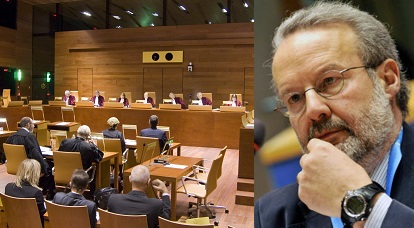In the case of Emilio de Capitani against the European Parliament, the European General Court has just ruled in favour of the plaintiff and thus in principle granted free access to intermediate stages of negotiations on EU legislation. 70 to 80 percent of EU laws are negotiated in an informal short-cut of the ordinary legislative procedure. In these non-transparent trialogue negotiations between the Commission, the Council of the Member States and Parliament, the national governments in the Council in particular insist on the secrecy of their positions while the negotiations continue – often for years. The General Court rejected the arguments put forward by the Council, the Commission and the official representatives of Parliament and ordered free access to the so-called four-column documents. These documents also contain the secret compromise wordings in the negotiation process. The versions of the Council also contain the positions of the individual Member States.
The European Parliament’s rapporteur for transparency, accountability and integrity in the EU institutions, Sven Giegold, comments:
„Today’s ruling is a major breakthrough for transparency and allows citizens free access to the back rooms of EU legislation that national governments have so far blocked. The application of the ruling can ensure that national ministers have to take a stance on compromises reached during ongoing negotiations and can no longer hide completely behind their colleagues while blocking tax justice, consumer protection or environmental protection. Citizens and civil society are finally given free access to intermediate versions of future EU laws, which have so far only circulated on the quiet among lobbyists representing financially strong interests. The plaintiff Emilio de Capitani has successfully revolutionised the trialogue procedure, which he himself invented as head of the secretariat of the Civil Liberties, Justice and Home Affairs Committee (LIBE) in the European Parliament. De Capitani and the judges have achieved transparency for citizens that the Christian-Democrat leaders of the EU institutions did not want to grant, not Commission President Jean-Claude Juncker, not Council President Donald Tusk and also not Parliament President Antonio Tajani. The report on transparency, accountability and integrity in the EU institutions, drafted on a Green initiative and adopted by the European Parliament in September 2017, actually called on Parliament to treat trialogue documents no different from other EU legislative documents, i.e. to publish them on own initiative. Thanks to the European General Court, the demands of civil society for greater transparency are now becoming a reality. The media can now report much more interestingly and realistically on European policy if differences of opinion on important issues become transparent as early as the negotiation process. Now the ruling must be implemented quickly. Both the Council and Parliament must now make trialogue documents public.“
ECJ judgement: http://curia.europa.eu/juris/document/document.jsf?text=&docid=200551&pageIndex=0&doclang=EN&mode=req&dir=&occ=first&part=1&cid=687524
ECJ press release: https://curia.europa.eu/jcms/upload/docs/application/pdf/2018-03/cp180035en.pdf
—
In an earlier version, we wrongly attributed the judgement to the European Court of Justice. Correctly, this is the judgement of the General Court. The European Parliament has to decide now if it wants to challenge this decision what could lead to a new judgement, then by the European Court of Justice. Parliamaments Legal Affairs Committee (JURI) has to decide on this follow up within 2 months.

